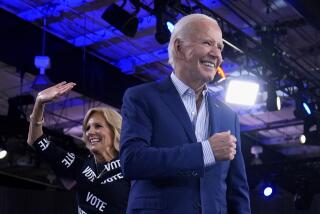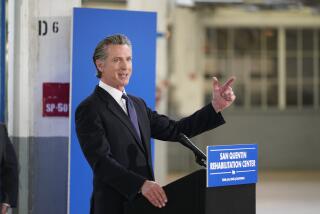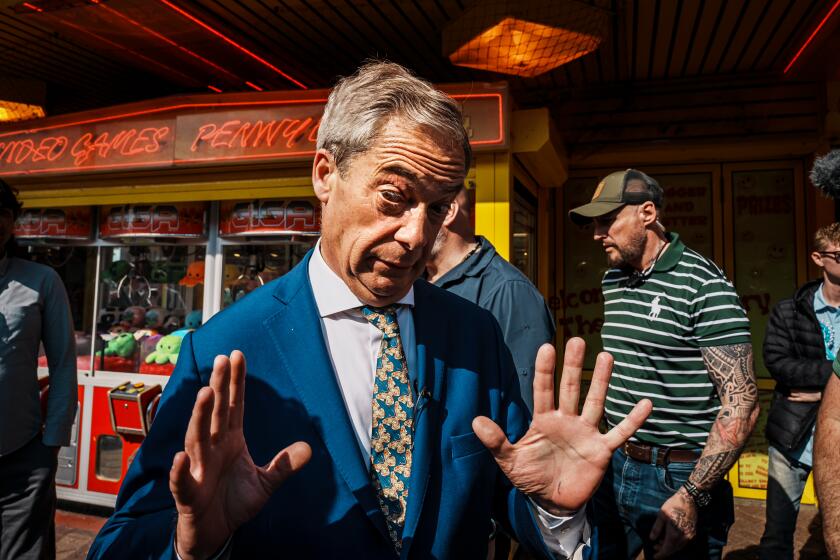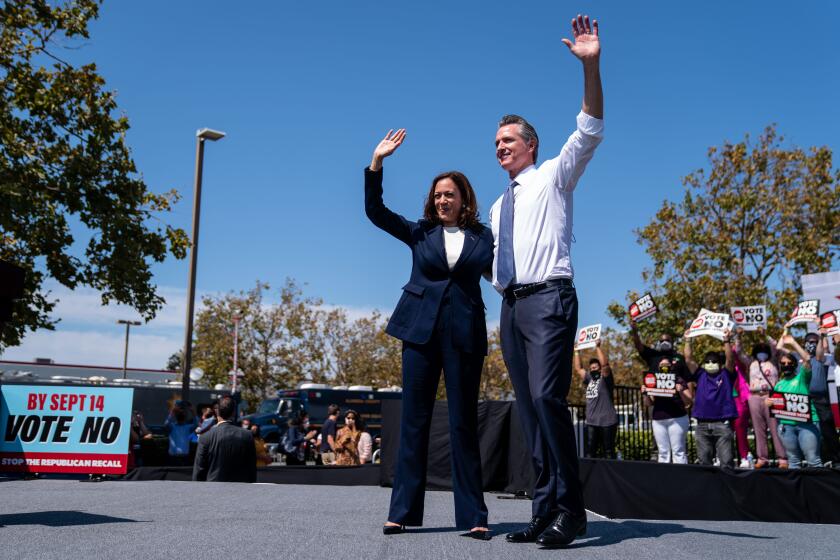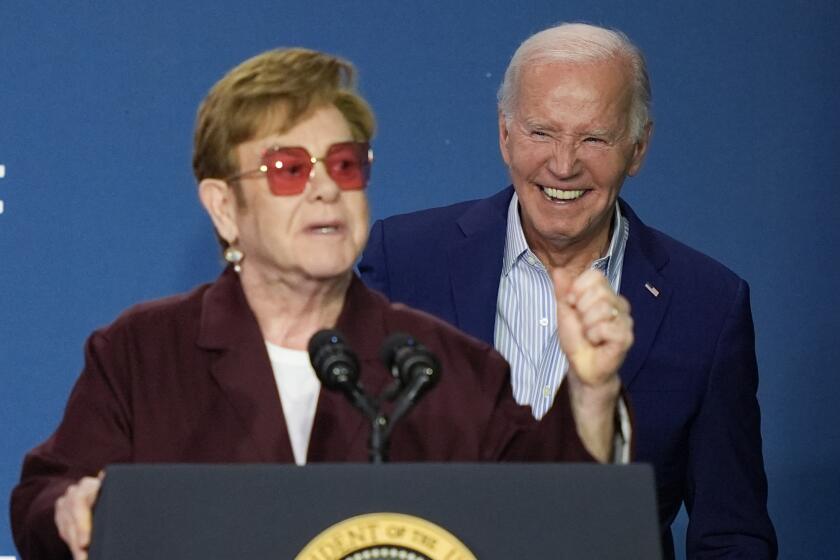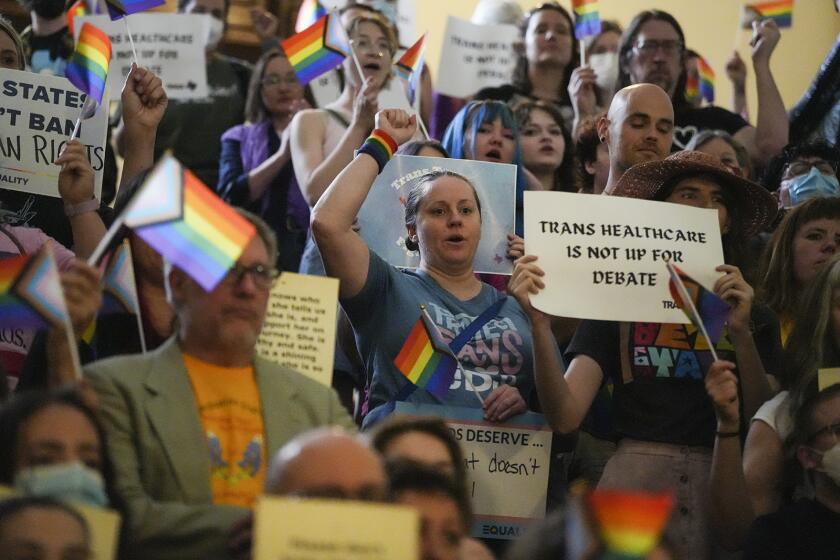Reagan to Join Bloody House Battle : Indiana District Race, Won by 4 Votes in ‘84, Turns Into Rematch
When President Reagan stumps in this old industrial town along the banks of the Ohio River today for Republican congressional candidate Rick McIntyre, he’ll be wading knee deep into the rematch of the year, a test of strength between the national Democratic and Republican parties, both trying to settle a two-year-old partisan feud here in Indiana’s “bloody Eighth.”
In fact, the nasty, razor-close struggle for the seat in the U.S. House of Representatives from Indiana’s 8th Congressional District, featuring a reprise of the controversial 1984 bout between Rep. Frank McCloskey, the two-term incumbent Democrat, and his Republican challenger, Richard D. McIntyre, has already been targeted as the biggest House race of the year by the two national parties.
Reagan’s visit clearly shows the importance the Republicans attach to the race; it’s his only campaign stop this fall designed solely to benefit a single Republican House candidate. Rep. Guy Vander Jagt (R-Mich.), who heads up the Republican Party’s House campaign efforts, has even labeled the 8th District campaign the party’s “number one House race in history.”
Still Contesting ’84
This seemingly minor campaign has taken on such epic proportions because the Republicans and Democrats never did agree on who won the first bitterly contested fight for the seat between McCloskey and McIntyre in 1984; that election turned into a battle royal that ended in a dizzying round of recounts and counter-recounts finally won by McCloskey over the protests of the Republicans.
In the ’84 contest, one of the closest congressional races in history, McIntyre, 30, and McCloskey, 47, ended up in a virtual tie that came down to whether a handful of ballots would be validated by election officials. McIntyre was first declared the winner by Indiana’s Republican secretary of state, but Democrats cried foul and the Democratically controlled U.S. House refused to seat him.
For a time, both McIntyre and McCloskey drew congressional pay, but neither was officially seated. Finally, after months of ballot recounts, the House voted in May, 1985, to declare McCloskey the winner by four votes out of 233,000 cast, approving the recommendation of a Democratically controlled House task force sent to Indiana to count the ballots.
Republicans were outraged by what they claimed was the theft of the seat, and the GOP House delegation walked out of the Capitol when McCloskey was finally seated.
Proving Who’s Right
“I don’t think anybody was happy with the process last time,” says McIntyre, with considerable understatement.
Now, both sides want to prove they were right in 1984 by winning in 1986.
The Republicans, especially, have been itching for a rematch, and have given McIntyre maximum support. Besides Reagan, Vice President George Bush, former President Gerald R. Ford, and a host of lesser Republican figures have campaigned here for McIntyre. The national party has contributed $50,000 and has sent political consultants to supplement McIntyre’s staff.
McCloskey, who has also received the maximum allowable in campaign contributions from the national Democratic Party, is countering Reagan’s visit with campaign appearances by Sen. Gary Hart (D-Colo.), Sen. Bill Bradley (D-N.J.), Rep. Richard A. Gephardt (D-Mo.), and House Majority Leader Jim Wright (D-Tex.).
But so far, the resources sent in by the national parties have had little impact. “The Republicans are just pouring money in here to prove a point--all that money to fly Air Force One in here--I don’t believe in that,” complains Louise Jernigau of Evansville, who says she will once again vote for McCloskey.
No Changes Seen
Pollsters agree that few voters have changed their minds about the candidates since 1984, and the race is once again considered dead even.
That’s nothing new here. This mostly rural district, which now stretches from Evansville in the southwest to the college town of Bloomington in the northeast, has long been one of the most evenly split in the House and has been dubbed the “bloody Eighth” for its tradition of hard-fought, close contests. Voters here are divided between agrarian populist and conservative Republican and have elected five different congressmen in the last decade.
As a result, many here believe another recount is in the offing.
“Basically, it’s a tie right now,” says Brian Vargus, director of the public opinion laboratory at the Indiana University-Purdue University joint campus in Indianapolis, who has conducted the only independent voter survey in the district this year. “And there are fewer undecided voters there than in any other district in the state.” Neither candidate has released his private polls, but both sides agree they are in a virtual draw.
“It’s not a complicated race right now--everybody knows who they are for,” agrees James Michels, politics reporter for the Evansville Courier.
Contest Becomes Negative
Desperate to land knockout blows and avoid yet another deadlock, both candidates have turned to stinging personal attacks, and voters here are complaining that the race is turning into a mudslinging contest.
In early October, McIntyre stunned McCloskey by holding a news conference with two former Bloomington police officers, who claimed that an informant had once told them that McCloskey had smoked opium while he was the city’s mayor in the 1970s.
McCloskey immediately admitted that he had twice smoked marijuana in the early 1970s, but denied he had ever tried harder drugs. The 30-year-old McIntyre denies that he has ever tried any type of illegal drug and has tried to portray McCloskey as soft on drug enforcement.
Veterans Have Doubts
Fighting back, McCloskey has encouraged local veterans who have questioned McIntyre’s military record. They charged that McIntyre, who appears in a Navy uniform in one television commercial, is not eligible to be considered a veteran. McIntyre has responded by saying he injured himself during his initial period of Navy training and was honorably discharged before he could go on active duty as a pilot.
More to Read
Get the L.A. Times Politics newsletter
Deeply reported insights into legislation, politics and policy from Sacramento, Washington and beyond. In your inbox three times per week.
You may occasionally receive promotional content from the Los Angeles Times.
